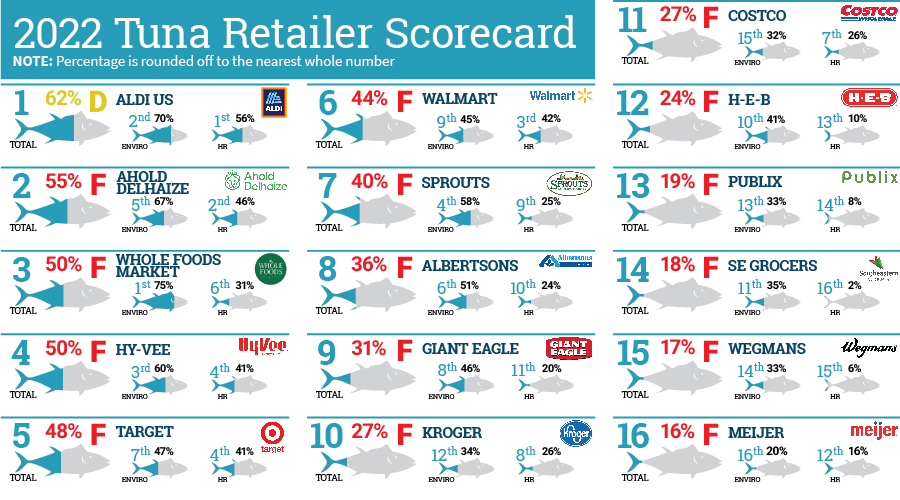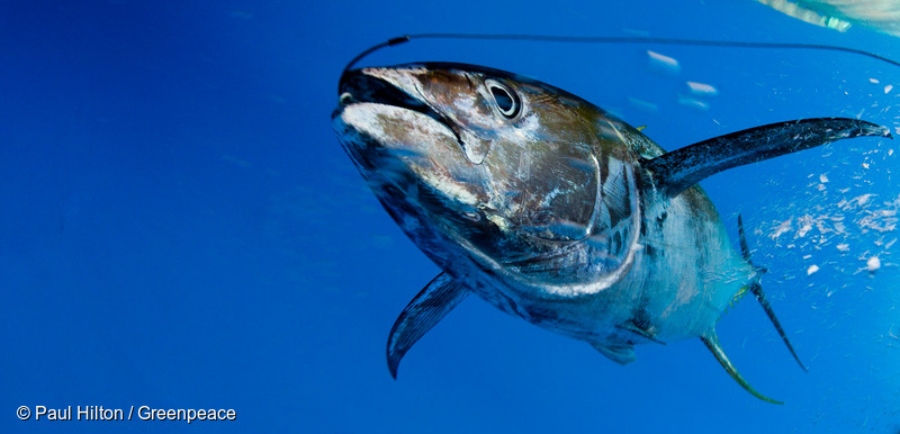Tuna free from human rights abuses is the absolute least corporations should guarantee their consumers.

Hi! I’m Marilu Cristina Flores, a Senior Oceans Campaigner with Greenpeace’s Beyond Seafood campaign. While I’ve only been working on this particular campaign for a short time (around three months), I’ve spent the better part of the last fourteen years learning about, studying, and working to change legislation and take action to protect our oceans.
With all my knowledge and experience, it would be easy to think that I know everything there is to know about the many problems that affect our oceans and their wildlife. But the High Cost of Cheap Tuna report that was just released showed me that there are many more problems and threats to understand and confront.
It wasn’t until I joined Greenpeace USA that I learned about the difficulties with distant water fishing (DWF), including illegal, unreported, and unregulated fishing (IUU), environmental destruction, and forced labor, and the way they work to reinforce each other in a negative feedback cycle. If, like me, you’re new to our organization or just familiarizing yourself with this campaign, welcome…and prepare to be shocked.
You’re probably not surprised to learn that tuna is the world’s most consumed marine fish. It’s a staple in most households. Every year, we consume about one billion pounds of canned and packaged tuna. However, what may surprise you, as it did me, is the presence and widespread prevalence of forced labor at sea – an essential component of the tuna supply chain that keeps prices low and profits high.
Workers in the deep sea fishing industry are especially vulnerable to exploitation due to the solitary nature of the job. Supply fishing fleets for this industry frequently head out to the middle of the world’s oceans, where they are not subject to the laws of any one country and are, therefore, able to violate human rights and environmental standards with relative ease. Americans want companies to embrace more eco-friendly and ethical labor methods, but the industry’s opaque supply chains and inadequate traceability systems/mechanisms have kept this reality mostly hidden from American consumers.
About a year ago, we released High Cost of Cheap Tuna, a report that rates businesses on how they treat workers and the environment. TLDR…everyone failed. Unfortunately, the second edition of this report, which we just released, shows that for the 16 stores surveyed, it has been pretty much business as usual. While two of the retailers passed the sustainability test when it came to their impact on the environment, only a few have taken steps to address human rights violations like forced labor. All retailers have failed the human rights part thus far, with the highest grade being a D (not exactly anything to brag about).

But at what price?
The United States is the largest tuna market globally, and American supermarkets enjoy a sizable share of the $42 billion in yearly sales generated by the sector. There is also no letup in sight for this upward trend, as the value of the global tuna industry is expected to reach $49 billion by 2029. Yet, while the lives and well-being of thousands of fishers are at risk and the oceans on which we depend continue to deteriorate, retailers have not yet instituted more stringent criteria for themselves and their suppliers.
We asked retailers if they require vessels to 1) comply with international safety standards, 2) provide vessel crews with adequate rest, nutrition, and potable water at no cost and 3) spend a maximum of three consecutive months at sea. Shockingly, fourteen of the retailers surveyed were unresponsive to our question about their commitment to requiring adequate access to drinking water. Albertson’s and Hy-Vee responded affirmatively to vessel safety, rest, nutrition, and potable water. Whole Foods indicated a commitment to a maximum of three months at sea. Aldi did not answer yes to any of these questions but expressed its commitment to “ensuring safety and health at sea and … supporting several efforts to raise standards for employment at sea.” No other retailers scored any points at all on what we consider to be a fundamental requirement to protect the safety and well-being of workers who are catching tuna in dangerous and often difficult conditions.

Greenpeace ship, Rainbow Warrior, is on an expedition in the Indian Ocean to expose overfishing and to highlight the problems associated with excessive tuna fishing, unsustainable or illegal fishing practices, the lack of law enforcement, and the need for countries to cooperate and ensure that communities benefit from the wealth of their oceans in future. Photo: Paul Hilton / Greenpeace
Consumers have a right to transparency in the supply chain. Unless a significant shift and focus on sustainably caught tuna is implemented, we face a deepening overfishing crisis and the possible extinction of numerous species of tuna. Further, no one should have to endure forced labor for the profit or benefit of others, and tuna free from human rights abuses is the absolute least corporations should guarantee their consumers.
As one of the biggest buyers of canned tuna, United States grocery store chains like Kroger must be leaders in pushing major tuna brands, like Bumble Bee Tuna, to do more to tackle human rights abuses in the commercial fishing industry.
Let retailers know that it’s time to take human rights abuses at sea off the menu, and we won’t be letting them off the hook.
